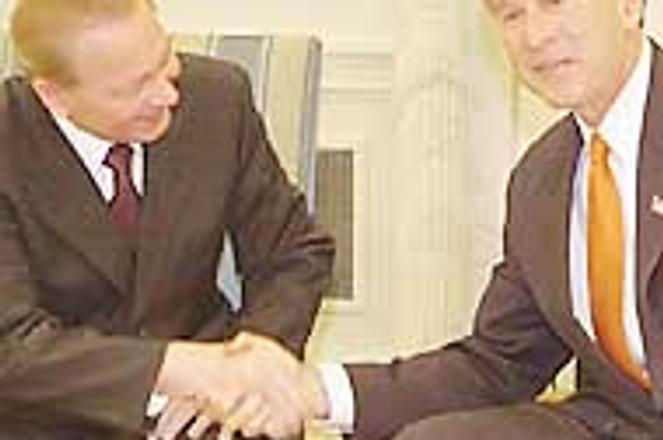PRESIDENT Schuster with US President Bush at the Oval Office on June 7.photo: TASR
ON HIS RETURN from a visit to top government members in the US and Canada, President Rudolf Schuster reported that both countries had pledged to help Slovakia become a Nato member provided the country formed a cabinet after the upcoming September general elections that did not include former Prime Minister Vladimír Mečiar or his HZDS party.
Although the message was "nothing new", according to domestic political and foreign policy analysts, Schuster's talks with US President George W. Bush - the first meeting of the countries' presidents since the creation of independent Slovakia in 1993 - were seen as shoring up key support for the young nation's western integration ambitions.
After being dropped from a previous Nato expansion round in 1997 under the autocratic Mečiar, Slovakia is seen as a front-running candidate to receive an invitation to join Nato later this year.
"This was a key top level visit ahead of the nearing elections followed by the November Nato summit [in Prague]. The Bush administration said clearly what was expected of us as an Alliance candidate," said Alexander Duleba, an analyst with the Slovak Foreign Policy Association (SFPA) think tank.
The Slovak president repeated his intention to use his constitutional power to appoint the next Slovak prime minister "in keeping with Slovakia's integration aims."
The statement has been widely interpreted to signal Schuster's intention not to aid Mečiar's return to power, even if the HZDS wins elections.
Denying press reports that he had privately promised not to appoint Mečiar, Schuster said: "If I excluded the HZDS in advance, I would be influencing the elections. I'm saying clearly that we want to get into Nato and the EU, but I can't say whom I will appoint to set up the next government."
US diplomats and Nato officials had repeated warnings before the Schuster visit that should Mečiar, whose commitment to democratic values western democracies doubt, be re-elected, the country's chances of joining Nato and the European Union (EU) would be nil.
"I will do everything in my constitutional power and I will use my moral authority to ensure a high turnout in the elections and to assure that Slovakia stays on its course toward democracy," Schuster said on June 7 after his 30-minute meeting with Bush in the Oval Office.
When he returned home, Schuster repeated that he would do his best to explain to Slovak voters the importance of the upcoming elections and campaign for a high voter turnout. He said he would include the appeal in his June 28 annual state of the nation address in parliament.
Schuster's delegation included Foreign Minister Eduard Kukan, Deputy Prime Minister for Minorities Pál Csáky and Defence Minister Jozef Stank, who was congratulated for his strides in reforming the Slovak army by Bush himself as well as by Pentagon officials.
Shortly before the US meet, cabinet on June 5 approved the sending of a unit of Slovak military engineers to Afghanistan to join the US-led Enduring Freedom operation. Local observers applauded the timing of the move.
Stank confirmed that the news had made a strong impression on the Bush administration because it "brings Slovakia closer to Nato and expresses our stance towards terrorism. Through this move we unequivocally join the world's anti-terrorist coalition."
Details of the operation remain secret. Prime Minister Mikuláš Dzurinda said that the cabinet was replying to an earlier US request; Stank added that the costs, paid from the state budget, were estimated at Sk80-100 million ($1.7-2.1 million).
While major ruling coalition parties pledged to support the cabinet decision in a parliamentary vote scheduled for June 19, voices from traditionally anti-Nato parties such as the Slovak National Party (SNS) and the Real National Party (PSNS) expressed dismay with what they saw as truckling to US interests.
Miroslav Šesták from the PSNS said on June 8 that his party "sees no reason to support it. It won't help us in anything, and on top of that our boys may lose their lives there".
Analysts, however, expect a nod from parliament because sending the unit requires a simple majority of 76 votes, with ruling coalition parties holding nearly 90 chairs in the 150-seat chamber.
Of the cabinet, only Justice Minister Ján Čarnogurský from the Christian Democrat (KDH) party opposed the move, arguing that the Slovak army had no strategy designed for sending its soldiers to war zones like Afghanistan.
However, two days later, a senior KDH organ recommended its MPs back the initiative in parliament.
Opposition parties have also spoken out against the close relationship between the Slovak government and the West.
SNS head Anna Malíková said Schuster's visit to North America "will go down in history as some kind of being called on the carpet.
"I'm offended that somebody wants to make a herd of sheep of us," Malíková said, referring to the US administration's anti-Mečiar policy, which was reinforced during the Schuster visit.
Mečiar himself denied that he was a threat to Slovakia's integration bids. In a June 10 interview with the pro-HZDS daily Nový Deň, Mečiar said that "fears of the HZDS's participation in the next Slovak cabinet after elections are unfounded." He added that Schuster's visit had only confirmed his expectation that Slovakia would be invited to join Nato at the Prague summit.
Schuster also discussed Slovakia's future with Canadian PM Jean Chretien in Ottawa. During the June 5 visit, Chretien repeated what Slovaks have heard from the West many times this year - that Mečiar's presence in the next government "may complicate your Nato entry".


